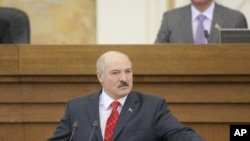Belarus President Alexander Lukashenko, long called the last dictator of Europe, is cracking down even harder on freedoms of speech, assembly and representation.
Struggling with an economic crisis, Lukashenko seems to be taking his country back to its totalitarian past - as a Soviet socialist republic.
Last week, he closed the last two opposition newspapers in the country. An editor of one, Narodnaya Volna, vowed to keep printing, either in exile or underground, echoing the samizdat [clandestine dissident] printing of the Soviet Union.
Then, Andrei Sannikov, a leading democratic politician, went on trial, standing with other democracy activists in a barred cage in a Minsk courtroom. His mother whispered to a foreign reporter that her son was going through a "show trial."
Stifling dissension
On Tuesday, the anniversary of the Chernobyl nuclear disaster, KGB agents greeted people attending an unofficial rally. Agents searched and photographed each participant.
For Natalia Koliada, a theater director who fled Belarus after last December’s post-election crackdown, the trials and newspaper closings make clear the increasingly totalitarian nature of the country's long-running dictatorship.
Speaking from New York, she said, "Finally the world understood that after 17 years of Lukashenko’s existence in power, that he is the last dictator in Europe."
President Lukashenko’s fear of free speech and assembly comes as anecdotal reports indicate many people believe that government agents were behind the April 11 Minsk metro bombing that killed 14 people and wounded 200. The president portrays the suspects as apolitical young men fascinated with explosives.
Sowing suspicion
Jana Kobzova, Belarus expert for the European Council on Foreign Relations, sees great skepticism on the Belarus Internet.
"It’s a lack of trust to the government. And I think if I were Lukashenko, I would be totally alarmed," said Kobzova. "Because basically he didn’t manage to sell well what he offered as an explanation, which means there are people who just don’t believe him any more."
Last week, a former Belarus KGB colonel, Vladimir Borodach, told Russia's NTV television that the two suspects "were used as mules who simply carried the bags."
Speaking from exile in Germany, he charged that the men were asked by the KGB to carry out the strike in a bid to deflect attention from the nation’s mounting economic problems. On Friday, the two men, still not publicly identified, were formally charged with terrorism - charges that can carry the death penalty.
Koliada agrees with this theory, saying, "I do believe it happened only because authorities wanted to take away attention of people of Belarus from economic problems."
Economic woes
Lukashenko clearly is feeling pressure. Last week, when asked by reporters why he did not attend a Chernobyl memorial ceremony in neighboring Ukraine, he lashed out, using locker room vulgarities to describe foreign political leaders.
As he spoke, the value of the Belarusian ruble fell, losing about half of its purchasing power in two days. With only enough hard currency to pay for two months of imports, Belarusians are seeing imported goods vanish from store shelves.
More importantly, factories are shutting down because managers are unable to buy imported parts. The state statistics office reports that the import shortages forced Belarusian companies last week to lay off 600,000 people -13 percent of the nation’s total work force.
UBS bank economist Jonathan Anderson said Belarus currently has the world’s fastest credit growth - and the fastest growing external deficit.
"This is patently and even rabidly unsustainable the way the numbers are shaping out now and you can’t just run an economy like this too long before you actually hit the abyss," said Anderson.
Moscow intervention
Moscow says that it will probably extend a $3-billion loan to Belarus this month - eight months after Minsk first made the request. Russia seems to be moving slowly in hopes of buying Belarus state assets on the cheap. Russia wants to buy Belarus’ oil refinery and its energy export pipelines.
Moscow is talking about extending the Russian ruble zone to include Belarus. But Anderson, speaking from Hong Kong, said Moscow’s planned loan would only buy Belarus six months before it is broke again.
"We have got a pretty fast moving train, right? And the tracks seem to end up ahead. That is the worry we have," said Anderson.
No help is expected from the West.
Last January, the U.S. and the European Union imposed travel restrictions on President Lukashenko and 158 aides.
Additional sanctions possible
Next week, the European Union is to debate matching American sanctions on two state companies that provide Belarus with most of its hard currency earnings [from sales of potash - a substance used in fertilizers - and petroleum products].
Kobzova talked last week with Belarus experts in Brussels. "EU will press hard with the economic sanctions if the political trials continue. That is the clear message that comes these days, and they are ready to do it."
At present, 12 political activists are on trial in Belarus. A second group goes on trial this week. At the same time, the main opposition party - the Belarusian People’s Front - is losing its headquarters, one of the last remaining venues in the capital for opposition events.
With an economic crisis bound to increase social tensions in the coming months, Lukashenko seems to be regressing to a political atmosphere familiar from his youth - creating a Soviet Belarus. He has ordered Belarus police to speed up completion of a project to fingerprint all adult men in the nation.




